实用英语翻译6 translation oversea study
- 格式:ppt
- 大小:699.00 KB
- 文档页数:20
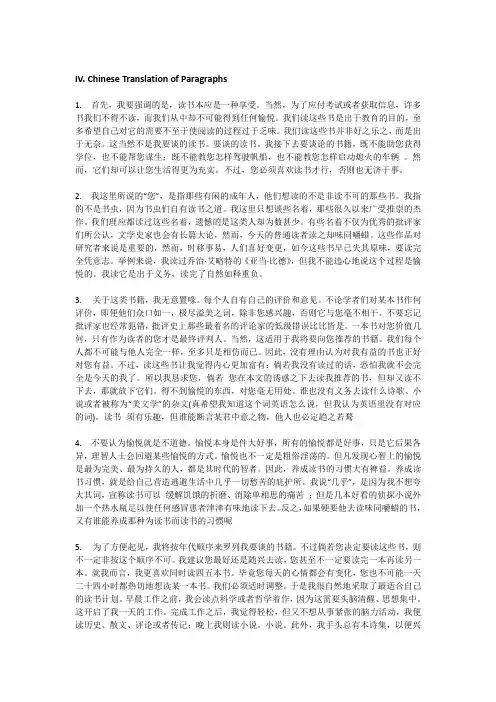
IV. Chinese Translation of Paragraphs1. 首先,我要强调的是,读书本应是一种享受。
当然,为了应付考试或者获取信息,许多书我们不得不读,而我们从中却不可能得到任何愉悦。
我们读这些书是出于教育的目的,至多希望自己对它的需要不至于使阅读的过程过于乏味。
我们读这些书并非好之乐之,而是出于无奈。
这当然不是我要谈的读书。
要谈的读书。
我接下去要谈论的书籍,既不能助您获得学位,也不能帮您谋生;既不能教您怎样驾驶帆船,也不能教您怎样启动熄火的车辆。
然而,它们却可以让您生活得更为充实。
不过,您必须喜欢读书才行,否则也无济于事。
2. 我这里所说的“您”,是指那些有闲的成年人,他们想读的不是非读不可的那些书。
我指的不是书虫,因为书虫们自有读书之道。
我这里只想谈些名着,那些很久以来广受推崇的杰作。
我们理应都读过这些名着,遗憾的是这类人却为数甚少。
有些名着不仅为优秀的批评家们所公认,文学史家也会有长篇大论,然而,今天的普通读者读之却味同嚼蜡。
这些作品对研究者来说是重要的,然而,时移事易,人们喜好变更,如今这些书早已失其原味,要读完全凭意志。
举例来说,我读过乔治·艾略特的《亚当·比德》,但我不能违心地说这个过程是愉悦的。
我读它是出于义务,读完了自然如释重负。
3. 关于这类书籍,我无意置喙。
每个人自有自己的评价和意见。
不论学者们对某本书作何评价,即便他们众口如一,极尽溢美之词,除非您感兴趣,否则它与您毫不相干。
不要忘记批评家也经常犯错,批评史上那些最着名的评论家的低级错误比比皆是。
一本书对您价值几何,只有作为读者的您才是最终评判人。
当然,这适用于我将要向您推荐的书籍。
我们每个人都不可能与他人完全一样,至多只是相仿而已。
因此,没有理由认为对我有益的书也正好对您有益。
不过,读这些书让我觉得内心更加富有;倘若我没有读过的话,恐怕我就不会完全是今天的我了。
所以我恳求您,倘若您在本文的诱惑之下去读我推荐的书,但却又读不下去,那就放下它们。

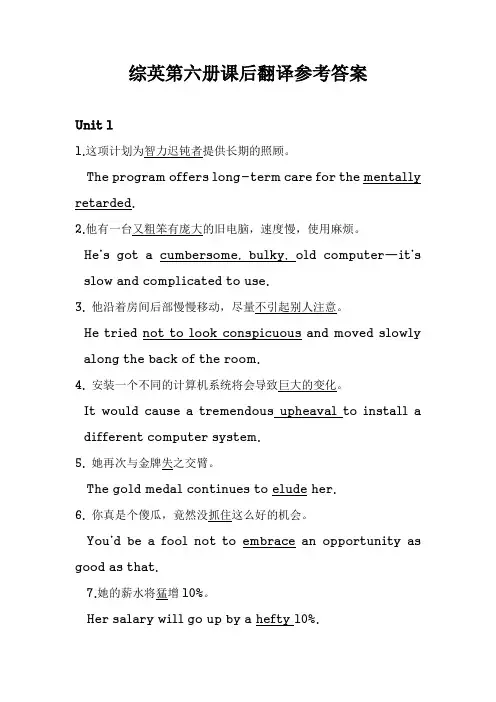
综英第六册课后翻译参考答案Unit 11.这项计划为智力迟钝者提供长期的照顾。
The program offers long-term care for the mentally retarded.2.他有一台又粗笨有庞大的旧电脑,速度慢,使用麻烦。
He’s got a cumbersome, bulky, old computer—it’s slow and complicated to use.3. 他沿着房间后部慢慢移动,尽量不引起别人注意。
He tried not to look conspicuous and moved slowly along the back of the room.4. 安装一个不同的计算机系统将会导致巨大的变化。
It would cause a tremendous upheaval to install a different computer system.5. 她再次与金牌失之交臂。
The gold medal continues to elude her.6. 你真是个傻瓜,竟然没抓住这么好的机会。
You’d be a fool not to embrace an opportunity as good as that.7.她的薪水将猛增10%。
Her salary will go up by a hefty 10%.8.我草草的留了张纸条给希拉里,塞在门缝底下。
I scrawled a quick note to Hilary and put it under her door.9.她的办公室视野极佳。
There’s a smashing view from her office.10 去那儿旅行很愉快,只是旅馆有些脏兮兮的。
The trip out there was swell, but the hotel was a bit crummy.Unit 21.这家公司是由几名有事业心的年轻人创立的。
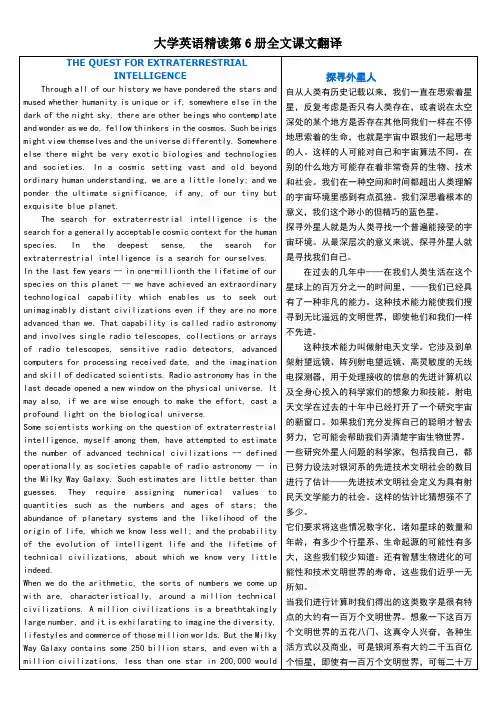
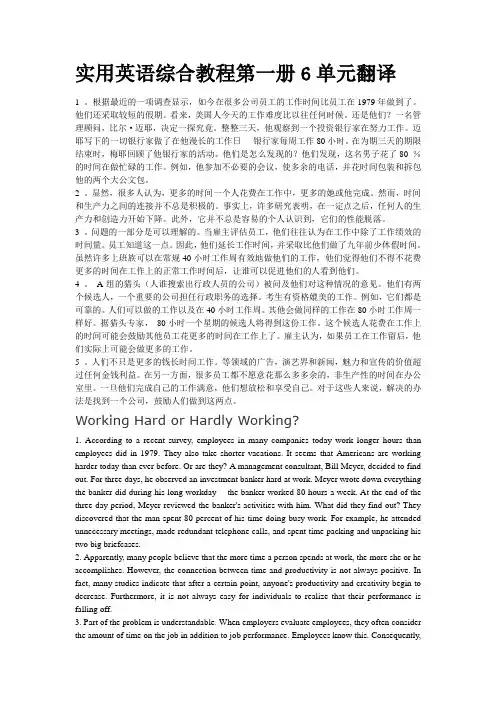
实用英语综合教程第一册6单元翻译1 。
根据最近的一项调查显示,如今在很多公司员工的工作时间比员工在1979年做到了。
他们还采取较短的假期。
看来,美国人今天的工作难度比以往任何时候。
还是他们?一名管理顾问,比尔·迈耶,决定一探究竟。
整整三天,他观察到一个投资银行家在努力工作。
迈耶写下的一切银行家做了在他漫长的工作日- 银行家每周工作80小时。
在为期三天的期限结束时,梅耶回顾了他银行家的活动。
他们是怎么发现的?他们发现,这名男子花了80 %的时间在做忙碌的工作。
例如,他参加不必要的会议,使多余的电话,并花时间包装和拆包他的两个大公文包。
2 。
显然,很多人认为,更多的时间一个人花费在工作中,更多的她或他完成。
然而,时间和生产力之间的连接并不总是积极的。
事实上,许多研究表明,在一定点之后,任何人的生产力和创造力开始下降。
此外,它并不总是容易的个人认识到,它们的性能脱落。
3 。
问题的一部分是可以理解的。
当雇主评估员工,他们往往认为在工作中除了工作绩效的时间量。
员工知道这一点。
因此,他们延长工作时间,并采取比他们做了九年前少休假时间。
虽然许多上班族可以在常规40小时工作周有效地做他们的工作,他们觉得他们不得不花费更多的时间在工作上的正常工作时间后,让谁可以促进他们的人看到他们。
4 。
A组的猎头(人谁搜索出行政人员的公司)被问及他们对这种情况的意见。
他们有两个候选人,一个重要的公司担任行政职务的选择。
考生有资格媲美的工作。
例如,它们都是可靠的。
人们可以做的工作以及在40小时工作周。
其他会做同样的工作在80小时工作周一样好。
据猎头专家,80小时一个星期的候选人将得到这份工作。
这个候选人花费在工作上的时间可能会鼓励其他员工花更多的时间在工作上了。
雇主认为,如果员工在工作留后,他们实际上可能会做更多的工作。
5 。
人们不只是更多的钱长时间工作。
等领域的广告,演艺界和新闻,魅力和宣传的价值超过任何金钱利益。
在另一方面,很多员工都不愿意花那么多多余的,非生产性的时间在办公室里。
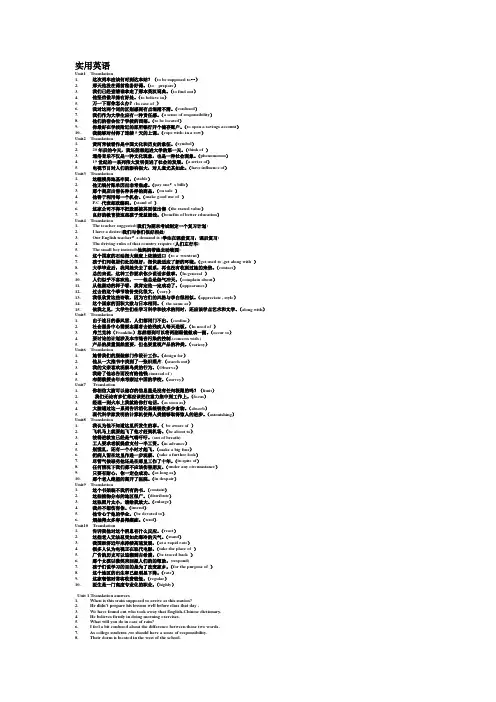
实用英语Unit1 Translation1. 这次列车应该何时到达本站?(to be supposed to…)2. 那天他没在课前准备好课。
(to prepare)3. 我们已经查清谁拿走了那本英汉词典。
(to find out)4. 他坚信做早操有好处。
(to believe in)5. 万一下雨你怎么办?(In case of )6. 我对这两个词的区别感到有点混淆不清。
(confused)7. 我们作为大学生应有一种责任感。
(a sense of responsibility)8. 他们的宿舍位于学校的西部。
(to be located)9. 你最好在学校附近的那所银行开个储存账户。
(to open a savings account)10. 我能够对付得了连续5天的上课。
(cope with: in a row)Unit2 Translation1. 黄河常被看作是中国文化和历史的象征。
(symbol)2. 20年后的今天,我还能想起进大学的第一天。
(think of )3. 通俗音乐不仅是一种文化现象,也是一种社会现象。
(phenomenon)4. 19世纪的一系列伟大发明促进了社会的发展。
(a series of)5. 电视节目对人们的影响很大,对儿童尤其如此。
(have influence of)Unit3 Translation1. 这幢楼房地基牢固。
(stable)2. 他无钱付账单因而非常焦虑。
(pay one’s bills)3. 那个商店出售各种各样的商品。
(on sale )4. 他善于利用每一个机会。
(make good use of )5. P.C 代表邮政编码。
(stand of )6. 这家公司不得不把股票按其面值出售(the stated value)7. 良好的教育使这些孩子受益匪浅。
(benefits of better education)Unit4 Translation1. The teacher suggested(我们为期末考试制定一个复习计划)2. I have a desire(我们与你们很好相处)3. Our English teacher’s demand is (学生在课前复习,课后复习)4. The driving rules of that country require (人们左行车)5. The small boy insisted(他妈妈带她去动物园)6. 这个国家的石油很大程度上依赖进口(to a …extent)7. 孩子们同邻居们处的很好,很快就适应了新的环境。
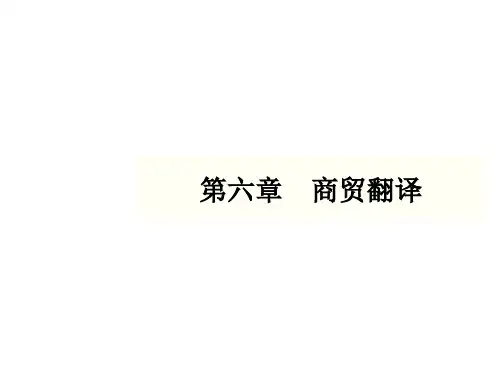
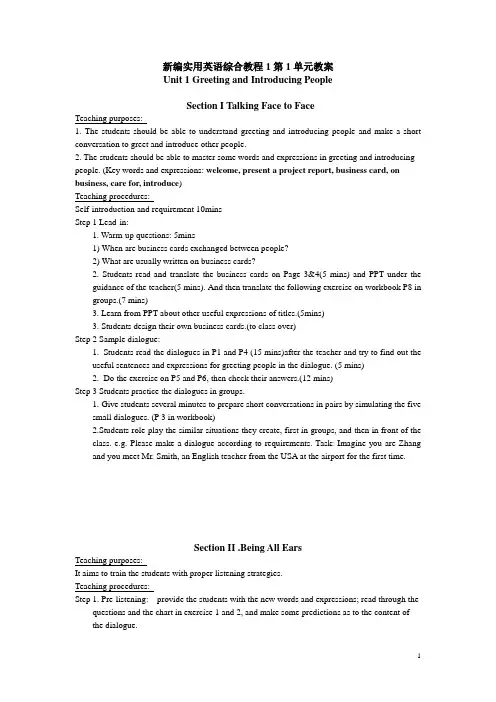
新编实用英语综合教程1第1单元教案Unit 1 Greeting and Introducing PeopleSection I Talking Face to FaceTeaching purposes:1. The students should be able to understand greeting and introducing people and make a short conversation to greet and introduce other people.2. The students should be able to master some words and expressions in greeting and introducing people. (Key words and expressions: welcome, present a project report, business card, on business, care for, introduce)Teaching procedures:Self-introduction and requirement 10minsStep 1 Lead-in:1. Warm-up questions: 5mins1) When are business cards exchanged between people?2) What are usually written on business cards?2. Students read and translate the business cards on Page 3&4(5 mins) and PPT under theguidance of the teacher(5 mins). And then translate the following exercise on workbook P8 in groups.(7 mins)3. Learn from PPT about other useful expressions of titles.(5mins)3. Students design their own business cards.(to class over)Step 2 Sample dialogue:1. Students read the dialogues in P1 and P4 (15 mins)after the teacher and try to find out theuseful sentences and expressions for greeting people in the dialogue. (5 mins)2. Do the exercise on P5 and P6, then check their answers.(12 mins)Step 3 Students practice the dialogues in groups.1.Give students several minutes to prepare short conversations in pairs by simulating the fivesmall dialogues. (P 3 in workbook)2.Students role-play the similar situations they create, first in groups, and then in front of theclass. e.g. Please make a dialogue according to requirements. Task: Imagine you are Zhang and you meet Mr. Smith, an English teacher from the USA at the airport for the first time.Section II .Being All EarsTeaching purposes:It aims to train the students with proper listening strategies.Teaching procedures:Step 1. Pre-listening: provide the students with the new words and expressions; read through the questions and the chart in exercise 1 and 2, and make some predictions as to the content of the dialogue.(Key words and expressions:1.Canada/The United States (of America) / the United Kingdom (of Great Britain andNorthern Ireland); England--Scotland--Welsh--Northern Ireland ;Britain;2.College3.Surprise surprise partyHis visit gave me a pleasant surprise. 他的来访使我感到惊喜。
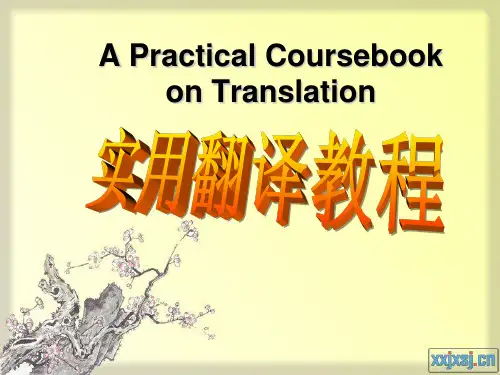
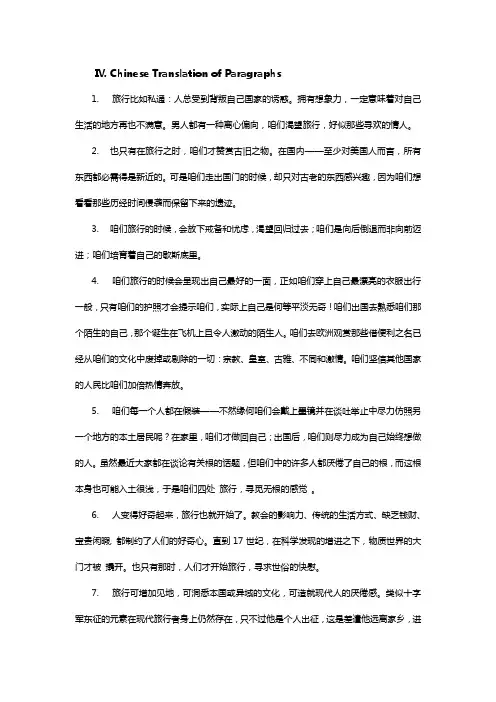
IV. Chinese Translation of Paragraphs1. 旅行比如私通:人总受到背叛自己国家的诱惑。
拥有想象力,一定意味着对自己生活的地方再也不满意。
男人都有一种离心偏向,咱们渴望旅行,好似那些寻欢的情人。
2. 也只有在旅行之时,咱们才赞赏古旧之物。
在国内——至少对美国人而言,所有东西都必需得是新近的。
可是咱们走出国门的时候,却只对古老的东西感兴趣,因为咱们想看看那些历经时间侵袭而保留下来的遗迹。
3. 咱们旅行的时候,会放下戒备和忧虑,渴望回归过去;咱们是向后倒退而非向前迈进;咱们培育着自己的歇斯底里。
4. 咱们旅行的时候会呈现出自己最好的一面,正如咱们穿上自己最漂亮的衣服出行一般,只有咱们的护照才会提示咱们,实际上自己是何等平淡无奇!咱们出国去熟悉咱们那个陌生的自己,那个诞生在飞机上且令人激动的陌生人。
咱们去欧洲观赏那些借便利之名已经从咱们的文化中废掉或剔除的一切:宗教、皇室、古雅、不同和激情。
咱们坚信其他国家的人民比咱们加倍热情奔放。
5. 咱们每一个人都在假装——不然缘何咱们会戴上墨镜并在谈吐举止中尽力仿照另一个地方的本土居民呢?在家里,咱们才做回自己;出国后,咱们则尽力成为自己始终想做的人。
虽然最近大家都在谈论有关根的话题,但咱们中的许多人都厌倦了自己的根,而这根本身也可能入土很浅,于是咱们四处旅行,寻觅无根的感觉。
6. 人变得好奇起来,旅行也就开始了。
教会的影响力、传统的生活方式、缺乏钱财、宝贵闲暇, 都制约了人们的好奇心。
直到17世纪,在科学发现的增进之下,物质世界的大门才被撬开。
也只有那时,人们才开始旅行,寻求世俗的快慰。
7. 旅行可增加见地,可洞悉本国或异域的文化,可造就现代人的厌倦感。
类似十字军东征的元素在现代旅行者身上仍然存在,只不过他是个人出征,这是差遣他远离家乡,进行说不清道不明的精神征战的一种冲动。
8. 固然,旅行最普通的原因就是为了远离家乡。
弗洛伊德说咱们旅行是为了逃离父亲和家庭,而咱们也可以补充说是为了逃离咱们熟悉的一切。
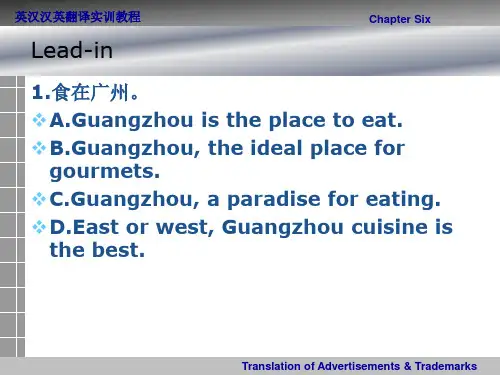
研究生英语课文翻译Unit 6Unit 6 Translation of Postgraduate English Course TextsIntroductionIn this article, we will explore the translation of postgraduate English course texts. The purpose of translating these texts is to assist postgraduate students in understanding and studying English course materials. Translating course texts requires proper techniques and considerations to ensure accurate and informative translations. In this article, we will discuss the challenges involved and provide guidelines for effective translation.Challenges in Translating Postgraduate English Course Texts1. Technical TerminologyPostgraduate English course texts often contain technical terms related to various fields of study. Translating these terms accurately requires in-depth knowledge in the specific subject area. Translators should possess expertise in both languages to ensure the correct translation of technical terminology. Additionally, the translator should keep updated with the latest developments in the field to capture the nuances and changes in technical vocabulary.2. Cultural ReferencesPostgraduate English course texts may contain cultural references that are unfamiliar to the target audience. Translators should be adept at adapting these cultural references to make them relevant and understandable for thereaders. This may involve explaining cultural concepts or finding equivalent references in the target language.3. Sentence Structure and StyleEnglish sentence structure and style may differ significantly from the target language. Translators should ensure that the translated text maintains the appropriate sentence structure, flow, and style while conveying the original meaning accurately. This requires linguistic skills and a deep understanding of both languages.Guidelines for Effective Translation of Postgraduate English Course Texts1. Understanding the ContextBefore starting the translation, it is crucial to thoroughly understand the context of the postgraduate English course text. Familiarize yourself with the subject matter, intended audience, and the purpose of the text. This understanding will enable you to provide an accurate and coherent translation.2. Research and Terminology ConsistencyDue to the technical nature of postgraduate English course texts, extensive research is necessary. Ensure that you have a solid understanding of the technical terminology used in the source text. Create a glossary of key terms and maintain consistency throughout the translation.3. Emphasis on Clarity and AccuracyWhen translating, prioritize clarity and accuracy to ensure effective communication. Use clear and concise language to convey the intended message. Avoid excessive wordiness or ambiguity, as it may confuse the readers.4. Cultural AdaptationAdapt cultural references to make them relatable to the target audience. If necessary, provide explanations or equivalents in the target language. This will enhance the readers' understanding and engagement with the translated text.5. Proofreading and EditingAfter completing the initial translation, thoroughly proofread and edit the text. Check for grammatical errors, typos, and inconsistencies. Make sure that the translated text adheres to the formatting requirements and guidelines provided.ConclusionTranslating postgraduate English course texts requires a comprehensive understanding of the subject matter, technical terminology, and cultural references. By following the guidelines mentioned above, translators can produce accurate, clear, and effective translations that assist postgraduate students in their English language studies.。
《实用英语翻译》教学参考第一部分笔译第一章翻译的标准和过程一、教学建议本章共分2小节,介绍翻译的标准和过程。
翻译是一项集艺术性和创造性为一体的艰苦脑力劳动,在翻译中做到“忠实、通顺”绝非一朝一夕所能达到的,需要付诸大量实践。
1.建议学时数:1课时。
2.本章重点难点:翻译的标准一直是翻译界经常讨论并十分关注的极为重要的问题,也是翻译理论研究和探讨的中心课题。
但翻译的标准各学派说法不一,历来争论不休。
严复提出的“信、达、雅”翻译准则,其实有时是相互矛盾的,译者若墨守成规,一成不变,只会顾此失彼。
现在共认的翻译标准主要有两条:忠实和通顺。
3.重点提示:翻译的目的是沟通两种文化的交流。
开设翻译课的目的不在于解决学生外语水平、汉语水平和知识水平的问题,而在于培养和提高学生的实际翻译能力。
二、答案(省略)第二章笔译的技巧(上篇)一、教学建议本章共分6小节,分别介绍一些笔译的方法和技巧。
笔译的技巧一般包括改变词类(conversion)、选词用字(diction)、词序调整(inversion)、省略(omission)、增词(amplification)、直译(literal translation)、意译(free translation)等。
这些翻译技巧是翻译工作者在多年翻译工作中的经验总结,希望能给初学者起到抛砖引玉的作用。
但切记翻译技巧不是“灵丹妙药”,翻译能力的提高还需进行大量翻译实践。
第一节词义的选择、引申和褒贬一、教学建议:1.建议学时数:2课时。
2.本节重点难点词语是翻译活动的基本单位,无论是句子、段落还是语篇,都是由单词构成的,因此,在翻译过程中,译者在弄清原句结构后,就要善于运用选择和确定原句中关键词词义的技巧,以使所译语句自然流畅,符合译文习惯说法。
翻译中对词义的选择、引申的褒贬是需要相当的基本功和反复推敲的,这不是一朝一夕能解决的问题,需译者多花精力,多多实践。
3.重点提示英语中有句古语:Words have no meanings: people have meanings for the words.(词本无义,义随人意。